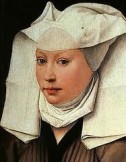 In 1373, when she was 30 years old, an Englishwoman had a visionary experience during a serious illness. After she had thought about it—perhaps soon after the experience, perhaps as much as fifteen years later—she wrote a relatively brief account of the visions and what they meant to her. But in 1393, she was still meditating on her experience and perhaps had begun to write a longer, more theologically-centered analysis. By 1394 she had become an anchorite, living in a cell attached to the parish church of St. Julian in Norwich (which may be the reason for the name we know her by); she was visited there by Margery Kempe in about 1413, and she was still living there in 1416.
In 1373, when she was 30 years old, an Englishwoman had a visionary experience during a serious illness. After she had thought about it—perhaps soon after the experience, perhaps as much as fifteen years later—she wrote a relatively brief account of the visions and what they meant to her. But in 1393, she was still meditating on her experience and perhaps had begun to write a longer, more theologically-centered analysis. By 1394 she had become an anchorite, living in a cell attached to the parish church of St. Julian in Norwich (which may be the reason for the name we know her by); she was visited there by Margery Kempe in about 1413, and she was still living there in 1416.
This is all we know of Julian’s life. Some scholars believe that she was at one time a member of a religious community; others think not. Some think that she wrote out her book (which modern editors call Showings or Revelations of Divine Love);others believe that the work was dictated.
” The passing life of the senses doesn’t lead
to knowledge of what our Self is.
When we clearly see what our Self is,
then we shall truly know
our Lord God in great joy.” 1
We do know from Showings that she was well-read in scripture and in spiritual works, both older and contemporary, so somewhere she had access to a good library. Her writing style is not the least bit naive: she handles complex thoughts clearly and is rhetorically effective. The rhetoric is perhaps easier to see in the first, shorter text; the complexity in the later, longer text.
Julian’s emphasis on God’s love and desire for human salvation becomes more significant when one thinks of the period in which she wrote. The Black Death came not only in 1349; it came again and again for over a century. The Church on whose faith Julian relied was in schism, with two or more popes claiming authority, from 1378 to 1417. Monastic writers and parish priests were teaching that all this was a punishment from an angry God. It is as if Julian saw the need to offer an antidote to the pervasive fear of sin and death and damnation; in both of her texts, she did
Source: Other Women’s Voices
Mother Julian of Norwich (1342 – 1416) Poems and Sayings
Links
- Other Women’s Voices – Comprehensive collection of links and reference material
- Revelations of Divine Love – Complete online text
- Selections from Julian of Norwich
(1) Quote taken from: The Wisdom of the Christian Mystics by T. Freke
